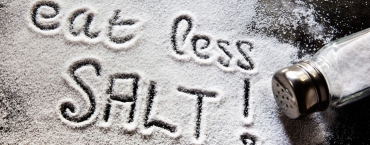Less salt, please

"Less salt, please" is the theme for the sixth annual World Salt Awareness Week taking place fom 11-17 March 2014
This year, World Salt Awareness Week will focus on the importance of reducing the sodium content of food prepared outside the home, such as in restaurants and
other settings. It encourages chefs, caterers, and the prepared food industry to decrease the amount of sodium added to food and the individual, to purchase
products with lower sodium content.
Some of the things we can do to reduce salt intake:
- Buy fresh, plain frozen or canned ‘with no salt added’vegetables
- Use fresh poultry, fish, and lean meat to prepare home cooked meals more often
- Use black pepper, fresh herbs or spices such as garlic, ginger, chilli and lime to flavour food during cooking and at the table
- Do not add salt to your home cooked meal, in fact leave the salt shaker of the table
- Snack on fresh fruit or vegetables rather than salty nuts, biltong, chips and droëwors
- When dining out select a restaurant that gives you the option to ask for no added salt
- Read the labels and choose lowest possible sodium option of your favourite convenience food including tomato ketchup,mayonnaise, breakfast cereal,pasta sauce and potato chips
- Cut back on frozen dinners,pizza, packaged mixes, canned soups and salad dressings often contains a lot of sodium
- Avoid eating processed and or cured meats such as bacon, polony, ham, salami, turkey,chicken and pastrami
- Eat less often, and in smaller portions pickles, gherkins, tinned food in brine such as tuna, green beans, strong salty cheeses,salted nuts, marmite or yeast preparations
Salt or sodium chloride (NaCl)
- Salt has been regarded as an essentialitem for centuries since it enhancesflavour and can preserve food. It was so rare and precious people bartered with it.
- In Rome soldiers at one time received salt (it is the origin of the word 'salary') as part of their salary.
- Science provided evidence of why sodium is so important to humans. Some of the most important reasons are that we need it to maintain and controlour fluid balance and heartbeat.
- It ensures your nervous system functions normally and our muscles contract.
- In modern times salt is freely available and many people are in the habit of adding salt to their food as soon as the plate is in front of them.
- However, with the development of commercially prepared food salt’s preservative abilities is even more important.
- It is added to most food stuffs that can be bought such as baked goods, junk food,processed foods and ready meals.
- This means that most people, even those who do not add salt at the table, often eat two to three times more salt than what they need (less than 6 gram per day) through the foods that they eat.
Science shows evidence that no salt (hyponatremia), just like too much salt (hypernatremia), can get you killed.
- The worst of the matter is that while the effect of no salt is like a shout (headache, nausea and vomiting,swelling, tiredness, cramps, confusion,seizures, coma and death) and is caused most commonly by drugs used to treat heart problems.
- Too much salt is a whisper. You have too really listen and pay attention or it is missed. Excessive salt intake is linked to high blood pressure which is the main
- cause of strokes and a major cause of heart attacks and heart failures, the most common causes of death and illness in the world. It is also widely recognised that a high salt diet is linked to other conditions, such as osteoporosis, cancer of the stomach, kidney disease, kidney stones, obesity and exacerbating the symptoms of asthma, Meniere’s Disease, Alzheimer’s
- Disease and Diabetes



